
11 Feb If You Can Guess The Third.
If you can guess the third.
Penn Jillette, on the Tim Ferris podcast, discussing his friend and inventor, Tim Jenison's observations on meeting people for the first time.
"When he's meeting somebody, if he learns two things from them and can guess the third, he's mostly uninterested. He kind of knows that person. It's interesting to look at oneself and to say, if someone has two cliché data-points on me, can they guess the third and be absolutely right?
It's one of the ways, perhaps unfairly, how you can decide how close you want to be to somebody. If they can tell you something early on that surprises you. As we build our theory of other minds, we get these points and then we guess the other points. If you can't do that, that's someone you want to fall in love with."
1.You're a realtor/estate agent.
2 You're great at your job.
Here's my guess:
You're passionate about property and people.

Colleagues love you. Vendors and landlords love you. It says so in your 5 star TrustPilot reviews. You never, ever, take No for an answer.
The extra mile?
Of, course!
Stop, where are you going? I haven't finished yet.
Awards?
Tick.
January, proving to be a very strong sales month? Twenty appraisals, two hundred viewings.
Tick.
Local market reports that position your agency, and only your agency, as 'expert'.
An agency so successful that they are in desperate need of more dynamic , results-driven staff.
Nearly every post on social media, bragging, promising, or manipulating.
Is that it?
Is that all you have?
Vendors and landlords unsurprisingly guessing your third data point?
Being blamed, when they choose another agency, or agent, over you - because you are either too afraid to be labeled as anything other than estate agent/realtor, or too comfortable with the status quo. Happy to part of the common. Winning just enough to survive. Without ever reaching your full potential.
There's a huge focus in real estate on what the agent should do. What they should say. What they should charge. What they should offer. It's a process, just like any other transactional process.
What gets missed, though, from this template of estate agency sapience, is the perception of the intended recipient.
The vendor.
Not some acquiescent dummy that the agent imagines would believe most everything they have been told.
But a real, live, thinking, questioning human being that is more interested in who the agent is, than in what they do, or how they do it.
Nobody is telling you, but it starts with that.

Before a word comes out of the agent's mouth, there's a perception - a story the vendor tells themselves.
It's people, not events, not data, that we're naturally interested in. It's the plight of blemished but engaging individuals that truly make us feel something.
"Humans have an extraordinary gift for reading and understanding the minds of other people. In order to control our environment, we have to be able to predict what they're going to do." -Will Storr.
We do that with story. Our brain is a "story processor, not a logic processor." writes psychologist, Professor Jonathan Haidt.
We look for social cues from people in their vocal tones, from their face and in their posture, in the stands they take on irrelevant points of view and we create an internal story to explain what we have observed.
Before the unwitting estate agent/realtor launches into the pitch of his/her life, we have already made a few assumptions.
First impressions.
Some favorable, others not so much.
And as the delivery continues, those impressions of this stranger are strengthened.
What the agent is saying (state and prove their worth) is important, of course, but not so much as what they are not saying.
They're not sharing values and beliefs. There's no affinity. It's just so transactional.
Which is why so many vendors choose the wrong agency, first time.
The rationale/logic happens after they have decided. Not before.
They have their opinion formed, well before the end of your pitch.
And they now justify that decision with their internal story.
The story that ends with "I just didn't like them enough."
Author and venture capitalist, Ben Horowitz, cites the example of Oprah Winfrey.
"Oprah can meet you and talk to you for 5 minutes and she can know you as well as someone who has known you for 10 years. ...she can read the tone of your voice, the expression on your face, the way you're holding your hands. Everything is high fidelity information to her and then she knows the exact right question to ask to get to the deeper level of what is going on."
Few homeowners have that capability. They don't know the exact right questions to ask, which for some agents, is a blessing. All they know is that you're not a good fit.
There is a solution, of course, to this problem.
How to shortcut the process of a vendor judging before they've heard what you have to say.

The solution is personal brand.
Allowing vendors/landlords to know who you are - before you ever meet.
Inspiring them with who you are - before ever understanding how you do what you do.
Personal Brand.
How much easier would it be for any agent to be invited to pitch to a vendor that already liked them?
Even when other realtors might be pitching, most people choose to do business with someone they already like.
Personal brand - where you don't have to guess the third data-point.
It's already in the public domain.
Tell me something that I don't know about you.
Tell me something, so that I can't guess what comes next.
Thanks, as always, for reading:)
Happy to help if you need some advice on personal brand and with the story that only you can tell.

Sorry, the comment form is closed at this time.